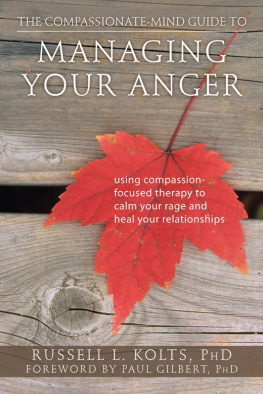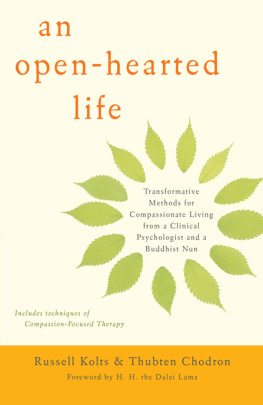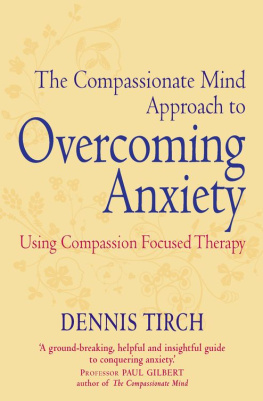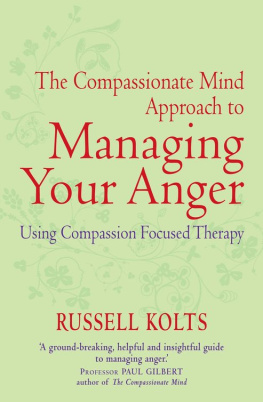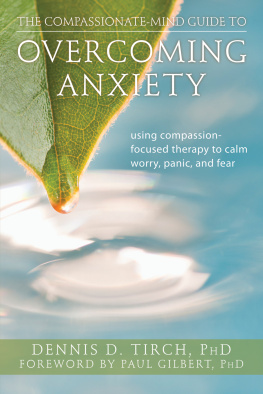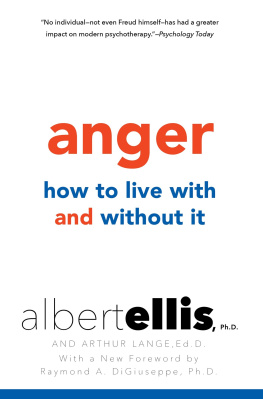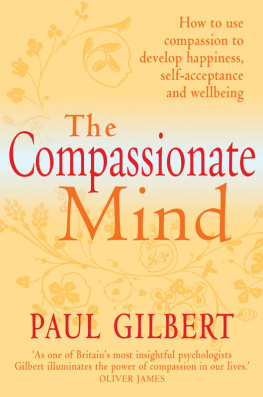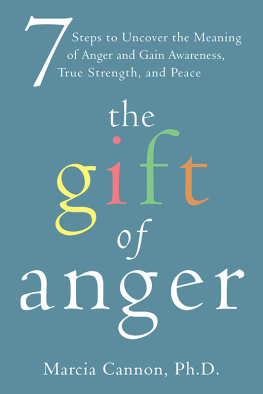Russell L. Kolts, PhD, is a clinical psychologist and professor at Eastern Washington University outside of Spokane, WA, and is founder of the Inland Northwest Compassionate Mind Center. He has many years experience treating anger problems in his work with combat veterans, sexual assault survivors, and mood-disordered clients of all ages. Kolts has pioneered the application of compassion-focused therapy (CFT) to anger, which he currently applies in private practice and prison settings.
Foreword writer Paul Gilbert, PhD, is a professor at the University of Derby in the United Kingdom, director of the mental health research unit at Derbyshire Mental Health Trust, and author of The Compassionate Mind.

With clear insights and easy-to-follow exercises, this innovative book teaches how to develop self-compassion so that anger can be transformed into a more peaceful state of mind.
Kristin Neff, PhD, author of Self-Compassion and associate professor of human development and culture at the University of Texas at Austin
In The Compassionate-Mind Guide to Managing Your Anger, Russell L. Kolts provides us with a novel approach to managing anger: compassionate mind training. Pointing out that we may not have a choice about how our brains react to provocation, Kolts skillfully shows that we do have a choice of how we respond. By calling upon our ability to experience compassion and empathy for others, he provides a number of helpful techniques that can turn anger around.
Robert L. Leahy, PhD, director of the American Institute for Cognitive Therapy and clinical professor of psychology at Weill-Cornell University Medical College
This intriguing book will bring a sigh of relief to anyone struggling with anger. Its not your fault that you experience anger, yet there is a lot you can do about it. Why do we get angry? What happens within us when were angry? Why is it so sticky? Russell L. Kolts gently escorts the reader to a deep, comprehensive understanding of anger and offers revolutionary new strategies for taming this common affliction. There is much here to inspire and illuminate both professional and non-professional audiences.
Christopher K. Germer, PhD, clinical instructor at Harvard Medical School and author of The Mindful Path to Self-Compassion
Cultivating compassion for ourselves and others can bring balance and harmony to our lives in a way we never dreamed of. Russell L. Kolts tells us how to do this with the gentleness, humor, and patience of someone who practices his own advice and, from first-hand experience, knows it works.
Thubten Chodron, Buddhist teacher and author of Working with Anger
With his compassion-focused approach to anger management, Russell L. Kolts has produced an important book that will be of interest both to the general public and to mental health practitioners. Kolts shows us how to use compassion as a motivating force to care for others, improve ourselves, and make relationships better. The chapters are filled with very useful thought questions and exercises that quickly increase self-awareness. Kolts writes in an appealing manner that makes the book an easy read.
Howard Kassinove, PhD, ABPP, professor of psychology and director of the Institute for the Study and Treatment of Anger and Aggression at Hofstra University
In this wonderful, kind, and compassionate book, Kolts reaches out with true heartfulness to those who struggle with problematic levels of anger. In a strikingly nonjudgmental, wise, and warm tone, he offers a path of loving-kindness and self-forgiveness that can directly lead you to a far better relationship with anger. This can open up remarkable new possibilities in life as you walk forward with ever-greater self-compassion and self-regulation into a world of improved relationships, diminished stress, and mindful awareness. This is more than anger managementit is an avenue toward personal transformation.
Dennis D. Tirch, PhD, author of The Compassionate-Mind Guide to Overcoming Anxiety
Full of useful information and practical suggestions. Kolts has created a powerful blueprint to help readers to develop a compassionate mindset, make better life choices, and foster more fulfilling relationships. He makes the case for compassion as an antidote to the loss and suffering that anger creates in our modern world.
Raymond Chip Tafrate, PhD, professor and chair in the department of criminology at Central Connecticut State University and coauthor of Anger Management for Everyone

Publishers Note
This publication is designed to provide accurate and authoritative information in regard to the subject matter covered. It is sold with the understanding that the publisher is not engaged in rendering psychological, financial, legal, or other professional services. If expert assistance or counseling is needed, the services of a competent professional should be sought.
Distributed in Canada by Raincoast Books
Copyright 2012 by Russell L. Kolts
New Harbinger Publications, Inc.
5674 Shattuck Avenue
Oakland, CA 94609
www.newharbinger.com
First published in the UK by Constable. An imprint of Constable & Robinson Ltd.
All Rights Reserved
Acquired by Tesilya Hanauer; Cover design by Amy Shoup; Edited by Carole Honeychurch; Text design by Tracy Carlson;
Cover photo by Ron Watts / GettyImages
Epub ISBN: 9781608828715
Library of Congress Cataloging-in-Publication Data
Kolts, Russell L.
The compassionate-mind guide to managing your anger : using compassion-focused therapy to calm your rage and heal your relationships / Russell L. Kolts ; foreword by Paul Gilbert.
p. cm.
Includes bibliographical references.
ISBN 978-1-60882-037-5 (pbk. : alk. paper)
1. Anger. 2. Compassion. 3. Mindfulness-based cognitive therapy. I. Title.
BF575.A5K66 2012
152.47--dc23
2012008369
This book is dedicated to the men of Airway Heights Corrections Center, who dare to cultivate compassion behind bars.
And to Lisa Koch and Dylan Kolts. My heart lives with you.
Foreword
We have always understood that compassion is very important for our well-being. If you are stressed or upset, its always better to have kind, helpful, and supportive people around you rather than critical, rejecting, or disinterested folk. However, its not only this common sense that tells us about the value of kindness and compassion. Recent advances in scientific study of compassion and kindness have greatly advanced our understanding of how compassionate qualities of the mind really do influence our brains, bodies, and social relationships, as well as affect our health and well-being. Yet, despite this common sense, ancient wisdom, and modern knowledge, we live in an age that can make compassion for ourselves and for others difficult. Ours is the world of seeking the competitive edge, of achievement and desire, of comparison to others who may be doing better, of dissatisfaction, of self-disappointment, and of self-criticism. Research has now revealed that such environments actually make us unhappy and that mental ill-health is on the increase, especially in younger people. As Dr. Russell Kolts helps us to understand, frustration, irritability, and anger are very common symptoms of the environments were living in today. Be it irritation with long lines, overly complex gadgets we cant work out how to use, traffic jams, whining children, or what we see as incompetent politiciansthe list of things that wind us up seems endless.

